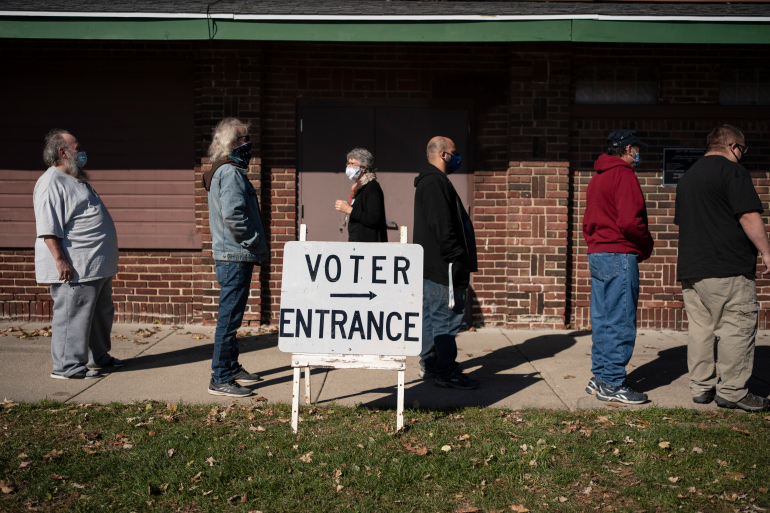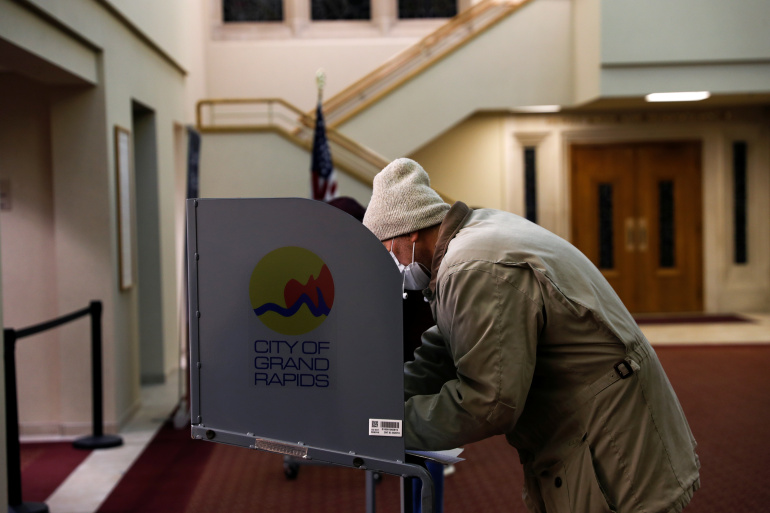Beyond Capitol riot, Trump voter fraud claims leave their mark
For Bonnie Scheele, the 2020 United States presidential contest was incomparable.
The need to tamp down conspiracies and misinformation, fuelled in large part by President Donald Trump’s false contention that widespread voter fraud occurred in the state, was unlike anything the Republican election clerk in the US state of Michigan had seen before.
“I can’t seem to convince people that there isn’t some sort of conspiracy or fraud,” said Scheele, a clerk in the right-leaning county of Grand Traverse who had to contend with a viral video in the wake of the November 3 election that alleged local postal workers backdated mail-in ballots.
Despite President-elect Joe Biden’s commanding margin of victory in Michigan of more than 154,000 votes, Trump contended that thousands of dead people voted and that piles of fraudulent Biden ballots were added to the count after Election Day.
Even after rioters – egged on by Trump’s assertions that the vote was “rigged” and “stolen” – overran the US Capitol on January 6 as Congress met to certify the final election results, the president has not dispelled his claims.
Instead, he maintained in a video released during the riot that “we had an election that was stolen from us”. Facing mounting pressure, he tepidly acknowledged a day later that Biden would take office on January 20.
 Voters wait in line outside a polling centre on Election Day, in Kenosha, Wisconsin. Social media posts shared thousands of times on Facebook, Twitter and Instagram falsely claimed that an impossible number of people cast ballots in Wisconsin [ File: Wong Maye-E/AP Photo]
Voters wait in line outside a polling centre on Election Day, in Kenosha, Wisconsin. Social media posts shared thousands of times on Facebook, Twitter and Instagram falsely claimed that an impossible number of people cast ballots in Wisconsin [ File: Wong Maye-E/AP Photo]Despite that muted concession, Trump’s conduct – and the initial tacit or explicit support he has received from the Republican National Committee and prominent members of his party – raises questions over the future of elections in the US.
Observers say the US elections system, in part, relies on defeated candidates accepting and affirming the results of the process – and a failure to do that is felt most strongly by local election officials who often find themselves on the front lines of misinformation.
“I really don’t know how [the future’s] gonna play out,” Scheele told Al Jazeera in an interview in early December, “because every time somebody’s candidate doesn’t win they might say that there’s voter fraud – from either party.”
“That’s not good because that erodes trust in our system.”
In Wisconsin, another state that has been at the centre of Trump’s campaign of baseless fraud allegations, Lori O’Bright, the clerk of Outagamie County, said while allegations of election misconduct have escalated in recent years, “this year has been unprecedented”.
O’Bright, a Republican, said a lack of trust in local election administrators plays into the spread of misinformation – and urged people to speak to their local officials and get involved to understand “the checks and balances of the system”.
“I’m not going to speak to one party or another party’s allegations, I’m only going to speak to my duties and duties that we’re charged with conducting,” she told Al Jazeera before Congress met to certify the results of the vote.
“But if [voters] really want to dig into an issue and learn about it and know about it, don’t look at the allegations by just anyone, whichever side. Learn what the actual processes are and understand what the actual process is.”
Results challenged
Observers say such a plea is a tall order in the face of Trump’s claims that Biden’s victory was achieved only through election malfeasance.
The allegations by Trump and his allies often encompass theories that are so widespread and pervasive they would require the participation of local election workers, county clerks from both parties, and statewide election officials, to be real.
 Steve Moeke, 64, casts his ballot in the 2020 US presidential election at the LaGrave Christian Reformed Church in Grand Rapids, Michigan, US, November 3, 2020 [File: Shannon Stapleton/Reuters]
Steve Moeke, 64, casts his ballot in the 2020 US presidential election at the LaGrave Christian Reformed Church in Grand Rapids, Michigan, US, November 3, 2020 [File: Shannon Stapleton/Reuters]The onslaught of unfounded fraud claims has fostered scepticism from the electorate towards local election officials, who had already been contending with the unprecedented challenges of conducting a safe election amid a pandemic, said James Young, a Republican and former director of elections in Louisville, Kentucky.
While past allegations of fraud in US elections have largely focused on outside actors trying to influence the results, the allegations during this election cycle focus more on misconduct from within the election systems themselves.
“This time, they’re actually calling into question who is counting the ballots, where the machine came from. Who created the machines?” Young told Al Jazeera. “That’s something that’s really changed in this election cycle.”
Those allegations include, among others, that there was massive “dump” of fraudulent Biden ballots in the early hours of November 4 in Wisconsin. That was actually the result of valid mail-in ballots not being counted until Election Day, per state law.
They also include debunked charges that more votes were cast than there are eligible voters in parts of Michigan and that hordes of dead people voted there, as well as in Arizona and Pennsylvania.
Another baseless allegation has been that Dominion Voting Systems, which provided voting machines across the US, is owned by Democratic actors. This week, Dominion filed a $1.3bn defamation lawsuit against Trump lawyer Sidney Powell over “wild accusations” that the company rigged the presidential election for Biden.
In many cases, the allegations conflate minor irregularities due to human error with massive fraud.
Nevertheless, a CBS poll released on December 13 indicated that Trump’s messaging resonated within his party weeks after Election Day, with 75 percent of Republicans surveyed saying they believed the election was not over and should still be contested.
The incident on Capitol Hill, which left four rioters and one Capitol Police officer dead, served as proof for many of just how resonant Trump’s claims were. A PBS NewsHour/Marist poll released two days after the riot found 18 percent of Republicans supported the pro-Trump rioters’ actions.
Even in the sombre hours after the Capitol was secured, six Republican senators and 121 Republicans in the House of Representatives continued to pursue objections to the electoral results in some states based on Trump’s claims.
‘Tarnished and muddied’
Kelly Michaels, a municipal election clerk in the city of Brookfield in Wisconsin and chair of the legislative arm of the Wisconsin Municipal Clerks Association, said the 2020 election cycle, which began with Trump falsely claiming that increased use of mail-in ballots due to the COVID-19 pandemic would lead to more fraud, had been “discouraging”.
While county clerks are elected officials in Wisconsin, municipal clerks are non-partisan career officials, which she said makes the president’s allegations particularly bruising.
“It kind of feels like when someone is accused of a crime and they sort of get judged by that, even though they haven’t had their day in court,” Michaels told Al Jazeera in December. “It’s like, even if you’re exonerated, you’re never exonerated because your reputation has been tarnished and muddied.”
“If you have someone like the president of the United States who is encouraging [allegations of widespread fraud], how do you combat that?” she added.
“No matter how many times you say there is no proof and you have people like me who have administered elections and have have done it with high integrity, it doesn’t matter, because you can say it as many times as you want, but [his supporters] will believe it.”
Emily Sumlin contributed research.
*** This article has been archived for your research. The original version from Al Jazeera English can be found here ***


